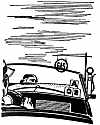 We have long been seeking for
other means of using the energy from
the sun. Recently, I mentioned that a single acre of our Ohio farms
received from the sun, in the three summer months, energy equivalent to
that developed by burning 250,000 gallons of gasoline - enough to take
care of the ordinary needs of over 2,400 cars for a year under the
present rationing! If we could devise some method of capturing that sun
energy, there would be no need for rationing at all. We have long been seeking for
other means of using the energy from
the sun. Recently, I mentioned that a single acre of our Ohio farms
received from the sun, in the three summer months, energy equivalent to
that developed by burning 250,000 gallons of gasoline - enough to take
care of the ordinary needs of over 2,400 cars for a year under the
present rationing! If we could devise some method of capturing that sun
energy, there would be no need for rationing at all.When man appeared on this earth, he must have - found vegetation in all forms. Green leaves of many kinds were trapping that sun energy and converting it into plant growth. We are now using through coal and petroleum the sun energy given to those green leaves millions of years ago. We do utilize, in another way, a small portion of the power by harnessing waterfalls - Niagara's great powerhouses are just using the energy of yesterday's sunshine. It is not because nature is trying to keep that secret - we just haven't fully evaluated the problem or spent anything like enough time working on it. Many people have studied this subject and all have made contributions. |








